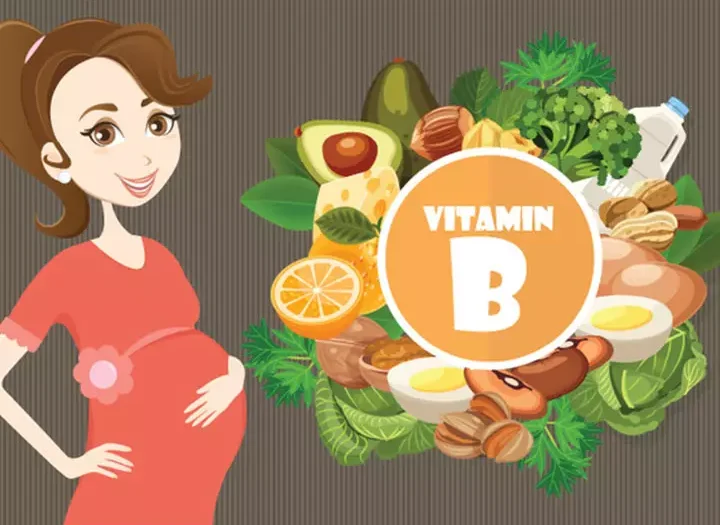Maintaining a healthy and balanced diet during pregnancy is crucial for both you and your baby’s well-being. B vitamins, often referred to as the vitamin B complex, are particularly important during this time. The B vitamins, especially B6, B9 (folic acid), and B12, play significant roles in reducing the risk of birth defects and alleviating some of the common symptoms associated with pregnancy.
Why B Vitamins Are Essential During Pregnancy
Vitamin B1 (Thiamine)
- Role: Supports your baby’s brain development.
- Recommended Daily Intake: 1.4 mg.
- Food Sources: Peas, oats, pork, lentils, pecans, salmon, Brazil nuts, dried beans, wheat germ, nutritional yeast, whole grain pasta, fortified bread or cereals.
Vitamin B2 (Riboflavin)
- Role: Promotes good vision, healthy skin, and supports the development of your baby’s bones, muscles, and nerves.
- Recommended Daily Intake: 1.4 mg.
- Food Sources: Almonds, sweet potatoes, carrots, oats, peas, tempeh, broccoli, spinach, asparagus, mushrooms, whole grains, nutritional yeast, fortified cereals, cottage and ricotta cheese, milk, eggs, natural yogurt, wild salmon, pork, chicken, beef (especially liver and kidney).
Vitamin B3 (Niacin)
- Role: Supports digestion, helps ease nausea, and may relieve migraines.
- Recommended Daily Intake: 18 mg.
- Food Sources: Turkey, venison, wild salmon, chicken breast, peanuts, crimini mushrooms, liver, tuna, peas, tahini, kidney beans, grass-fed beef, sunflower seeds, avocados, asparagus, tomatoes, bell peppers, sweet potato, brown rice.
Vitamin B5 (Pantothenic Acid)
- Role: Helps metabolize fats, proteins, and carbohydrates, and helps prevent pregnancy-related muscle cramps.
- Recommended Daily Intake: 6 mg.
- Food Sources: Sunflower seeds, sweet potato, avocado, whole grains, crimini mushrooms, oats, organic corn, cauliflower, wild salmon, chicken breast, milk, oranges, bananas, sun-dried tomatoes, trail mix.
Vitamin B6 (Pyridoxine)
- Role: Essential for your baby’s brain and nervous system development; may help with morning sickness.
- Recommended Daily Intake: 25-50 mg (do not exceed 100 mg).
- Food Sources: Garlic, beans, sweet potatoes, chickpeas, avocados, hazelnuts, sunflower seeds, brown rice, prune juice, spinach, bananas, papayas, chicken, pork loin, wild salmon, turkey, grass-fed beef, Safe-Catch Elite tuna.
Vitamin B7 (Biotin)
- Role: Supports healthy hair, skin, and nails; essential for embryonic growth.
- Recommended Daily Intake: 30 mcg.
- Food Sources: Oats, avocado, spinach, broccoli, cauliflower, legumes, royal jelly, fortified cereal, brewer’s yeast, blackstrap molasses, Swiss chard, wild salmon, mushrooms, wheat bran, cheese, raspberries, egg yolk, chicken, potatoes, soy, milk, nuts, liver, pork.
Vitamin B9 (Folic Acid)
- Role: Reduces the risk of neural tube defects; supports placenta growth and red blood cell production.
- Recommended Daily Intake: 400-800 mcg (not to exceed 1,000 mcg).
- Food Sources: Lentils, spinach, great northern beans, fortified cereals, asparagus, avocado, peas, nuts, dried beans, egg noodles, beef liver, sprouts.
Vitamin B12 (Cobalamin)
- Role: Supports nervous system health and helps prevent neural tube defects.
- Recommended Daily Intake: 2.6 mcg.
- Food Sources: Wild salmon, soy milk or soy products, shrimp, grass-fed beef liver or tenderloin, yogurt, fortified cereals, red meat, Swiss cheese, milk, cottage cheese, cod.
Summary of B Vitamin Roles During Pregnancy
- B1 (Thiamine): Supports brain development.
- B2 (Riboflavin): Promotes vision and skin health.
- B3 (Niacin): Aids digestion and reduces nausea.
- B5 (Pantothenic Acid): Prevents leg cramps.
- B6 (Pyridoxine): Supports brain development and helps with morning sickness.
- B7 (Biotin): Supports hair, skin, and nail health.
- B9 (Folic Acid): Reduces birth defects and supports red blood cell production.
- B12 (Cobalamin): Supports the nervous system and prevents neural tube defects.
Conclusion
While prenatal vitamins usually contain the necessary amounts of B vitamins, it’s essential to complement them with a balanced diet rich in these nutrients. Always consult your healthcare provider before adding any supplements to your routine, and remember that a healthy diet is vital for both you and your growing baby. Enjoy your pregnancy, stay active, eat well, and keep asking questions to ensure the best health for you and your baby.



